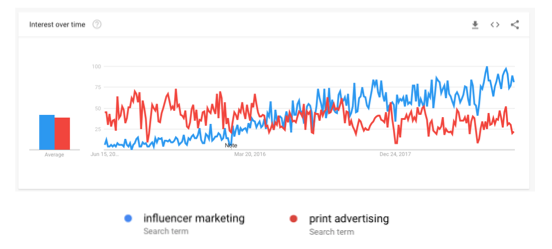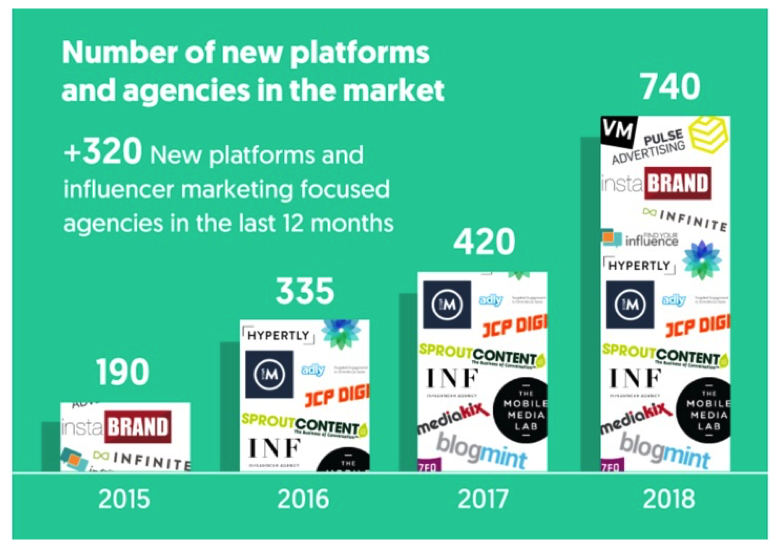It has become common knowledge that in order for a brand to create an integrated marketing plan they need to incorporate (or at the least explore) the use of social media and the specific use of influencers to drive consumers to buy your product. In fact, according to an article, in 2015 the rate of return on influencer spend is 550% (“Influencer”, 2019). It’s no wonder that influencer marketing is becoming a popular communication channel for disseminating product information and creating awareness. In most recent years, the explosion of influencer marketing has become so prominent that it has surpassed other traditional forms of promotion.
Google Trends reveals that in interest in influencer marketing has surpassed traditional print advertisements over the past 5 years.

According to Williams (2017) in an article on marketing influencers, almost 50% of millennials’ product consumption is a direct result of social media content they have encountered (Williams, 2017). He further states that majority of product influencing happens in person outside of the social media ‘box’ (Williams, 2017).
Take Mark Schaefer, an experienced marketing professional with a long history of dealing with traditional advertising, set out to become a marketing consultant. As part of this challenge, he admitted to launching a successful practice through the use of social influence, with zero spending on any form of advertising for the first several years (Bell, 2012). Schaefer’s story is not unique, many new businesses are looking for cost effective ways to market and promote their product. And in some cases, this may mean doing things yourself, like Schaefer.
So what does this mean for advertising agencies?
While influencer marketing maybe on the rise, the concept of determine how this maybe done can still be daunting. In fact, an entire business model of advertising agencies centered on social media and influencer expertise has emerged. According to a recent report from Influencer MarketingHub, 320 new agencies centered on influencer marketing emerged in 2018, at a growth rate of 57% since 2017 (“Report”, 2019).

Image Source: https://influencermarketinghub.com/influencer-marketing-2019-benchmark-report/
Furthermore, according to Influencer MarketingHub’s report, 50% of their companies they surveyed stated that a good portion of their marketing budget will be allocated to influencer specific campaigns (“Report”, 2019). When considering the rise of social media influence gains traction as an effective tactic, coupled with the increase in agencies focused on this niche, it begs the question on what will happen to advertising agencies as we know them today. Will these new specialized platform agencies replace traditional advertising agencies? Or will advertising agencies need to take on this new form of engagement?
According to Berger (2013), creating a buzz is more than just posting on social media. It’s about understanding the social and physiological elements of human interaction (Berger, 2013). In other words, in order to be memorable and create meaningful buzz that translates to success, strategy and thought will need to be leveraged. What this most likely mean, is that companies and businesses will become more heavily dependent on experts in this field or in other words agencies focused on social media. If traditional agencies are forward thinking, they would capitalize on this transition to ensure they still receive a bigger piece of the pie.
Resources:
Bell, G. (2012). Create a buzz around your business through influence marketing: Interview with mark W. schaefer, author of return on influence.Strategic Direction, 28(9), 33-36. doi:http://dx.doi.org.libproxy2.usc.edu/10.1108/02580541211256549
Berger, J. (2013). Contagious: Why some ideas die and others survive.
Influencer MarketingHub (2019). 50 Influencer Marketing Statistics, Quotes and Facts. Retrieved from: https://influencermarketinghub.com/influencer-marketing-statistics-quotes-facts/
Influencer MarketingHub Report (2019). The State of Influencer Marketing 2019: Benchmark Report. Retrieved from https://influencermarketinghub.com/influencer-marketing-2019-benchmark-report/
Williams, L., (2017, Oct. 20) Has Influencer Marketing Lost Its Bloom? Retrieved from: https://www.cmswire.com/digital-marketing/has-influencer-marketing-lost-its-bloom/
